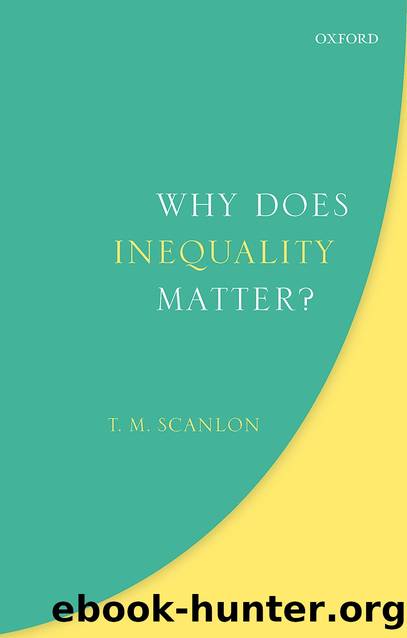Why Does Inequality Matter? by T. M. Scanlon

Author:T. M. Scanlon [Scanlon, T. M.]
Language: eng
Format: epub
ISBN: 9780192540881
Publisher: OUP Oxford
Published: 2017-10-19T00:00:00+00:00
1 Martin Gilens, “Inequality and Democratic Responsiveness,” and Affluence and Influence, chapters 3 and 4.
2 Larry Bartels, “Economic Inequality and Political Representation.” Subsequent research has raised some questions about Gilens’s conclusions. See Peter K. Enns, “Relative Policy Support and Coincidental Representation,” and Omar S. Bashir, “Testing Inferences about American Politics: A Review of the ‘Oligarchy’ Result.” For Gilens’s response, see “The Insufficiency of ‘Democracy by Coincidence’: A Response to Peter K. Enns.”
3 Justice as Fairness, 139.
4 Gerald Gaus, responding to Rawls’s objection, points out that there are high levels of political participation in the United States. See The Order of Public Reason, 515–20.
5 Political Liberalism, 327.
6 Justice as Fairness, 46.
7 For a defense of the alternative view, according to which individuals should be selected for political office on grounds of merit, see Daniel A. Bell, The China Model.
8 Cohen, “Money, Politics, Political Equality,” 273. The idea of equal opportunity for influence is also emphasized by Niko Kolodny in “Rule Over None II: Social Equality and the Justification of Democracy.” Kolodny discusses mainly equal formal opportunity for influence, exercised through voting. Cohen and I are mainly concerned with what Kolodny calls “informal opportunity for influence,” which he discusses near the end of his paper (332ff.).
9 The point made in Chapter 5 about “willingness” applies here as well. Having access to a means in the relevant sense requires not only being able to use that means if one chooses to do so but also being in a good position to decide whether to do so.
10 Cohen writes, “In 1996, the candidate who outspent his of her opponent won 92 percent of the House races and 88 percent of the Senate races” (“Money, Politics, Political Equality,” 281). As he notes, the interpretation of these facts is complicated because incumbents are more likely to win and also better fund-raisers. Cohen concludes, “Putting complexities aside, what seems undeniable is that the success of candidates depends on their fund-raising success, that the capacity to raise money depends on their performance, that the ability to attract support from the groups that give depends on their conduct; contributors, by providing such support, gain some measure of influence over electoral outcomes” (283).
11 So, just as in the case of the Substantive Opportunity component of equality of opportunity, the competitive, hence comparative, nature of the procedures in question pushes an adequate conception of “sufficiency” toward equality. I argued in Chapter 5 that this effect might be constrained, if not eliminated, if the college admissions and other mechanisms of selection were indeed procedurally fair. The analogous strategy in this case would be to make political campaigns less dependent on money spent.
12 For depressing evidence that elections are in fact determined by irrelevant factors, see Christopher Achen and Larry Bartels, Democracy for Realists.
13 Gilens concludes from his research that what best explains the greater influence on political outcomes is the greater amount of money that the rich spend on campaign contributions. See Affluence and Influence, chapter 8.
14 Gilens, “Inequality and Democratic Responsiveness,” 781.
Download
This site does not store any files on its server. We only index and link to content provided by other sites. Please contact the content providers to delete copyright contents if any and email us, we'll remove relevant links or contents immediately.
The remains of the day by Kazuo Ishiguro(7551)
Tools of Titans by Timothy Ferriss(6946)
The Black Swan by Nassim Nicholas Taleb(6190)
Inner Engineering: A Yogi's Guide to Joy by Sadhguru(5895)
Giovanni's Room by James Baldwin(5877)
The Way of Zen by Alan W. Watts(5798)
The Six Wives Of Henry VIII (WOMEN IN HISTORY) by Fraser Antonia(4790)
The Power of Now: A Guide to Spiritual Enlightenment by Eckhart Tolle(4755)
Astrophysics for People in a Hurry by Neil DeGrasse Tyson(4620)
Asking the Right Questions: A Guide to Critical Thinking by M. Neil Browne & Stuart M. Keeley(4574)
12 Rules for Life by Jordan B. Peterson(3734)
The Ethical Slut by Janet W. Hardy(3502)
Skin in the Game by Nassim Nicholas Taleb(3460)
Housekeeping by Marilynne Robinson(3401)
The Art of Happiness by The Dalai Lama(3382)
Double Down (Diary of a Wimpy Kid Book 11) by Jeff Kinney(3272)
Skin in the Game: Hidden Asymmetries in Daily Life by Nassim Nicholas Taleb(3264)
Walking by Henry David Thoreau(3234)
12 Rules for Life: An Antidote to Chaos by Jordan B. Peterson(3200)
